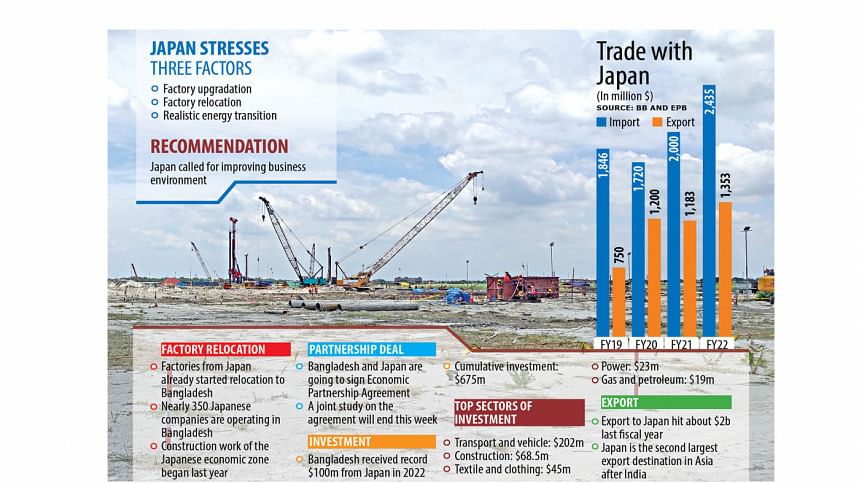More Japanese investors to flock to Bangladesh

Bangladesh has the potential to attract Japanese companies shifting operations to various parts of Asia, said Yasutoshi Nishimura, economy, trade and industry minister of Japan, yesterday.
He said factory relocation has already started.
Japanese company Honda has opened its factory in Bangladesh and BJIT, an information technology firm, has started production in the country.
"I do expect that more companies will come to Bangladesh," Nishimura said while speaking at a daylong summit styled "Bangladesh-Japan Economic Relations for the Next 50 Years: for the industry upgradation of Bangladesh" at the Pan Pacific Sonargaon Hotel in Dhaka.
Japan's relationship with Bangladesh has reached a strategic relationship from the previous comprehensive relationship during a summit in Tokyo in April, the minister said, suggesting improving the business environment for more trade and investment.
The Japan External Trade Organisation (Jetro), in collaboration with the Bangladesh Investment Development Authority (Bida), the Federation of Bangladesh Chambers of Commerce and Industry (FBCCI), the Japan Bangladesh Chamber of Commerce and Industry, the Chittagong Chamber of Commerce and Industry, and the Japanese Commerce & Industry Association in Dhaka, organised the summit.
Nishimura said the economic relationship between Bangladesh and Japan for the next 50 years will be based on three pillars: Bangladesh's industrial upgradation, the shift by Japanese companies, and the realistic energy transition.
He praised Bangladesh's economic growth, which has maintained between 5 per cent and 8 per cent GDP expansion annually over the last many years, saying the country has developed more than they had imagined.
Regarding Bangladesh's industrial upgradation, the minister said Japan has already started supporting the construction of various infrastructures through the Japan International Cooperation Agency (Jica).
The projects include the Matarbari power plants and the deep seaport.
In April, the Jica also signed a memorandum of understanding (MoU) for the capacity-building of the industry promoting agency in Bangladesh.
"Jica is also supporting Bangladesh in the IT sector development," he said.
The Bangladesh Special Economic Zone, also known as the Japan economic zone, is being developed at Araihazar in Narayanganj while the Metro rail in Dhaka has already been partially opened to the public.
Currently, nearly 350 Japanese companies are operating in Bangladesh, with more than $380 million in combined investment.
Of them, 85 per cent want Bangladesh and Japan to sign an Economic Partnership Agreement (EPA) to accelerate trade and investment between the two countries.
In 2022, Bangladesh received more than $100 million in investment from Japan, a record, as the number of Japanese companies quadrupled in the country over the last one decade, Nishimura said.
In order to strengthen the bilateral relations, both countries are now working to sign the EPA and it is expected that a joint study for the deal will be completed by this week.
A Japanese delegation is coming to Dhaka in this connection, the minister said.
Tipu Munshi, commerce minister of Bangladesh, said the EPA may be signed before 2026, the year when Bangladesh will become a developing nation graduating from the group of the least-developed countries.
Japan and India are two export destinations in Asia where Bangladesh's export earnings reached $2 billion, he said.
Industries Minister Nurul Majid Mahmud Humayun sought investment from Japanese entrepreneurs in the automobile industry as Bangladesh is trying to establish a globally standard automotive sector.
He also called for investments in the light-engineering sector.
Zunaid Ahmed Palak, state minister for ICT, said internet has reached 13 crore people in Bangladesh while 100 per cent of the population has access to electricity.
The receipts from IT exports stand at more than $1.5 billion, he said.
At the JP-BD Summit in Tokyo in April, the economy, trade and industry ministry of Japan and the commerce ministry of Bangladesh launched a bilateral cooperation framework for the industry upgradation of Bangladesh to contribute to the post-LDC economy and the target of the Vision 2041.
The economy, trade and industry ministry has focused on six areas as the potential fields of public-private cooperation: garment, heavy industries, logistics, circular economy, clean energy and IT.
Jetro President Kazushige Nobutani and Japanese Ambassador in Bangladesh Kiminori Iwama also spoke at the summit.
"Bangladesh needs efficient energy for sustainable development where renewable energy can play an important role," said FBCCI President Md Jashim Uddin in another session.
"Japan can work in Bangladesh's renewable energy sector as the East Asian country has experience in the area," he said, adding that the business community from the two countries can collaborate in the area.
The government is providing Japanese businesses with all sorts of assistance so that they invest in Bangladesh, said Lokman Hossain Miah, executive chairman of the Bida.
"There are many potential sectors such as medicare, agriculture, fuel and energy where Japanese businesses can invest."
He said the Bida has made most of its services available online.
"Within a few months, we are going to ensure that all services are provided from a single place."
At the summit, the governments inked three MoUs to enhance two-way trade and investment.
Bangladesh Special Economic Zone Ltd (BSEZ) inked an MoU with Bangladesh IRIS Co Ltd, a Bangladesh-Japan joint venture promoting education for children, to purchase land and get the right to use the land at the second phase of the zone.
BSEZ signed the second MoU with Brac Kumon Ltd to provide education opportunities to school-going children near the zone.
The commerce ministry penned an MoU with the Jetro to cooperate with each other to exchange trade information and enhance the capacity of officials.

 For all latest news, follow The Daily Star's Google News channel.
For all latest news, follow The Daily Star's Google News channel. 



Comments